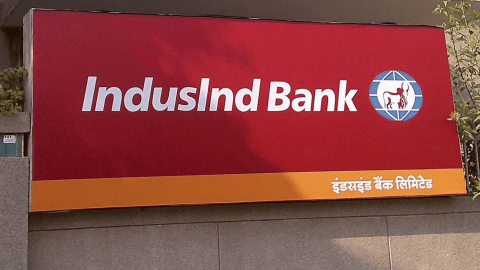IndusInd Bank Share Price Target at Rs 737: LKP Research Downgrades Stock
IndusInd Bank has encountered one of its most turbulent quarters in recent memory, and LKP Research has acted swiftly in response, slashing its rating to REDUCE and assigning a revised 12-month target price of Rs 737, indicating a potential downside of 6% from current levels. A convergence of management shakeups, accounting irregularities, and operational deterioration has eroded investor confidence. Despite a historically strong retail presence and resilient vehicle loan book, the shadow of governance missteps and elevated asset quality stress casts a long shadow over the bank’s immediate future.
Key Earnings Miss Sparks Downgrade
IndusInd Bank reported a net loss of Rs 23 billion in Q4FY25, plunging 199% YoY and 266% QoQ, a figure that sent shockwaves through the market. The key driver behind this erosion was the reversal of Rs 6.8 billion in MFI interest income, alongside a massive Rs 19.6 billion hit from derivative losses.
Net Interest Income (NII) plunged 43.3% YoY to Rs 30 billion, weighed down by lower yields on advances and a sharp contraction in MFI contribution. Net Interest Margin (NIM) compressed by 200 bps YoY to 2.3%, marking a historic low.
One-Offs and Structural Weaknesses Drive Operating Loss
Pre-provision operating loss came in at Rs 5 billion, a stark reversal from Rs 41 billion profit a year ago. Operating expenses surged, leading to a shocking Cost-to-Income (C/I) ratio of 113%, reflecting operational inefficiencies and diminishing profitability.
Additional provisioning of Rs 25 billion, including Rs 17.9 billion related to MFI loan misclassification, compounded the crisis, and management's credibility took a direct hit.
Asset Quality Deteriorates; CASA Base Cracks
The bank's loan book grew a muted 0.5% YoY, signaling a strategic slowdown, especially in the corporate and MFI portfolios. MFI loans de-grew 8.9%, and corporate loans declined 5.6%, pointing to stress and risk aversion.
Gross NPAs jumped to 3.13% in Q4FY25 from 2.25% in the previous quarter, while Net NPAs increased to 0.95%. Slippages rose to Rs 48 billion, more than double the Rs 22 billion in Q3.
Deposit mobilization faltered too: CASA deposits dropped 7.5% YoY, and the CASA ratio plunged to 33% from 38.5% a year earlier. Term deposits, however, rose 15.5% YoY, highlighting investor preference for fixed income over transactional banking.
Leadership Vacuum and Governance Lapses
The bank’s governance has come under heavy scrutiny after the resignation of both the CEO and Deputy CEO. Regulatory pressure from the RBI has prompted an accelerated CEO selection process, with a deadline set for June 30, 2025.
A string of misclassifications, including Rs 7.6 billion recorded as interest income instead of other income, revealed deeper accounting control weaknesses. Though the bank claims these do not impact its bottom line, confidence has taken a significant hit.
Financial Snapshot: FY25 Performance at a Glance
Below is a summary of IndusInd Bank’s financial performance:
| Key Metrics | FY25 | FY24 | Change (%) |
|---|---|---|---|
| Net Interest Income | Rs 190 bn | Rs 206 bn | -7.7% |
| Net Profit | Rs 26 bn | Rs 90 bn | -71.3% |
| Gross NPA Ratio | 3.13% | 1.92% | ↑ |
| Cost-to-Income Ratio | 60.1% | 47.1% | ↑ |
| RoA | 0.5% | 1.8% | -72% |
| RoE | 4.0% | 15.2% | -73% |
Valuation Outlook and Revised Guidance
LKP Research has recalibrated its valuation approach, now pegging IndusInd Bank at 0.9x FY27E Book Value per Share. Despite the current valuation being below the three-year historical average of 1.6x, the downgrade to REDUCE reflects the high degree of uncertainty surrounding operational execution and internal governance.
The stock currently trades at a P/E of 23.3x, which is no longer justifiable amid deteriorating asset quality, slippage risk, and management turbulence.
Forward Strategy and Cautious Optimism
The new management, once appointed, will face the unenviable task of restructuring operational frameworks, restoring investor confidence, and overhauling risk governance.
While the bank’s vehicle finance segment remains resilient, and broader retail and SME strategies are being explored, analysts expect a gradual rebalancing of the loan book toward secured granular retail loans. This transition, however, is unlikely to deliver short-term gains and will weigh on profitability in the next 18–24 months.
Investment Recommendation and Stock Levels
Given the weak earnings visibility, high provisioning environment, and internal instability, LKP Research’s revised recommendation is REDUCE with the following stock metrics:
| Stock Metrics | Value |
|---|---|
| Current Market Price | Rs 785 |
| Target Price | Rs 737 |
| 52-Week High / Low | Rs 1,550 / Rs 605 |
| P/E (FY25) | 23.3x |
| P/BV (FY25) | 1.0x |
Final Word: Storms Before Stability
IndusInd Bank’s recent woes signal a decisive moment in its trajectory. With a new leadership on the horizon and plans to re-anchor growth toward less volatile retail assets, there’s cautious optimism. However, the recovery is unlikely to be linear. Until internal controls are re-established and earnings stabilize, the stock is better watched from a distance than chased aggressively. Investors are advised to tread cautiously.
